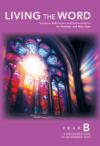Scripture Study for
Twenty-Third Sunday in Ordinary Time
Wisdom 9:13–18b / Psalm 90:1 / Philemon 9–10, 12–17 / Luke 14:25–33
<< Back to LECTIONARY RESOURCES
Understanding the Word
By Dr. Karla J. Bellinger
The Bible tells us that when he became king, Solomon prayed to God to give him wisdom, that he might have a “listening heart to judge your people. . . . For who is able to give judgment for this vast people of yours?” (1 Kings 3:4–9). In the book of Wisdom we are given an extended version of this prayer, in which Solomon asks God, “Who understands what is pleasing in your eyes and what is conformable with your will?” (9:9). Today’s reading continues that prayer, the point of which is that without the wisdom that comes from God as a gift of the Holy Spirit (9:6,17), humans are crippled in their ability to understand reality. If they have trouble figuring out the natural and human world, how can they possibly know the ways of God without the gift of wisdom, which is freely given to anyone who seeks it earnestly?
Here is what we are able to discern about Philemon, Onesimus, and Paul from this very short letter. Onesimus is a slave of Philemon and has, apparently, run away and ended up with Paul, who is in prison. There he has been baptized by Paul, so that Paul can call Onesimus his “child” and himself his “father.” Paul is now sending Onesimus back to Philemon, a fellow Christian, with the hope that the latter will free the slave and send him back to Paul. The Apostle does not want to command anything of Philemon, but he hopes that he will do the right thing once he realizes that Onesimus is now his “brother,” not only as a fellow human being but especially as a fellow Christian. Paul expects Philemon to recognize that Christians cannot relate to one another according to the world’s standards.
Jesus returns to an earlier point about commitment to discipleship (Luke 9:51–62) to make things perfectly clear: not even family, not even one’s own life must take precedence over Jesus. The word translated “hate” here should rather be rendered “deny” or “give up.” Jesus gives his reason for this through two examples, both of which highlight the need to be fully prepared before one begins a major project. It is notable that in both examples, preparation means adequately supplying oneself with money or people, whereas Jesus concludes what seems to be the opposite: to prepare to follow him, one must get rid of everything. This is a paradox, because by giving up everything, one gathers to oneself the interior and exterior freedom to give oneself completely to Christ.
